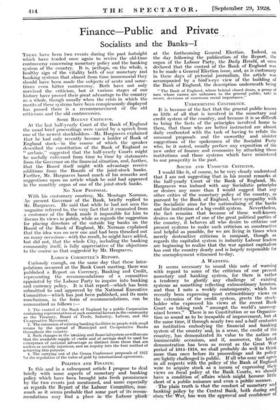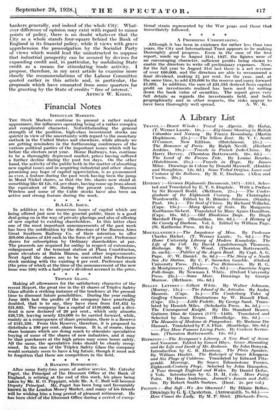Finance—Public and Private
Socialists and the Banks—I
THERE have been two events during the past fortnight which have tended once again to revive the old-time controversy concerning monetary policy and the banking system of the country. It is, perhaps, on the whole, a healthy sign of the vitality both of our monetary and banking systems that. almost from time immemorial th6 should have been made the subject's of acute and some-. times even bitter controversy. Both have not only survived the criticism, but at various stages of our history have proved their great advantage to the -country as a whole, though usually when. the crisis in which the merits of these systems have been conspicuously displayed has passed there is a recommencement of the old criticisms and the old controversies.
SOME RECENT CRITICISM.
At the last half-yearly Court of the Bank of England the usual brief proceedings were varied by a speech from one of the newest stockholders—Mr. Hargraves explained that he had only recently become a holder of Bank of England stock—in the course of which the speaker described the constitution of the Bank of England as " archaic," suggested that the half-yearly Courts might be usefully enlivened from time to time by statements from the Governor on the financial situation, and, further, that the Board itself might with advantage receive additions from the Boards of the joint-stock banks. Further, Mr. Hargraves based much of his remarks and suggestions upon an article which he said had appeared in the monthly organ of one of the joint-stock banks.
No NEW PROPOSAL.
With his customary courtesy, Mr. Montagu Norman, 'he present Governor of the Bank, briefly replied to Ur. Hargraves. He said that while, he had not seen the magazine referred to, the very fact -that it emanated from - a customer of the Bank made it impossible for him to discuss its views in public, while as regards the suggestion for placing directors of the outside big banks on the Board of the Bank of England, Mr. Norman explained that the idea was no new one and had been thrashed out on many occasions—with the result, he might have added, but did not, that the whole City, including the banking community itself, is fully appreciative of the objections to the course as that suggested by Mr. Hargraves.
LABOUR COMMITTEE'S REPORT.
Curiously enough, on the same day that these inter- polations occurred at the Bank Court meeting, there was published a Report on Currency, Banking and Credit, representing the recommendations of a committee appointed by the Labour Party to inquire into banking and currency policy. It is that report—which has been submitted to and approved by the National Executive Committee—which has just been published, and its main ,Conclusions, in the form of recommendations, can •be summarized as follows :—
1. The control of the Bank of England by a public Corporation containing representatives of such essential factors in the community as the Treasury, Board of Trade, Industry, Labour, and the Co-operative Movement. 2. The extension of existing banking facilities to people with small means by the spread of Municipal and Co-operative Banks throughout the country. 3. Such changes in the banking and financial system as will secure that the available supply of credit and of savings shall be used for enterprises of national advantage as distinct from those that are useless or socially injurious, and an inquiry into the best method of achieving this purpose. 4. The carrying out of the Genoa Conference proposals of 1922 for the regulation of the value of gold by international agreement.
POLITICS AND FINANCE.
In this and in a subsequent article I propose to deal briefly with some aspects of monetary and banking policy which have been brought into fresh prominence by the two events just mentioned. and more especially as regards the Report of the Labour Committee, inas- much as it seems probable that some _part of its recom- mendations may find a place in the Labour -plank- at the forthcoming General Election. Indeed, on the day following the publication of the Report, the organ of the Labour Party, the Daily Herald, at once declared that the control of the Bank of England was to be made a General Election issue, and, as is customary in these days of pictorial journalism, the article was accompanied by a bird's-eye view of the building of the Bank of England, the description underneath being " The Bank of England, where behind closed doors, a group of Men whose names are unknown to the general public, take in secret, decisions of enormous social importance."
UNDERMINING CONFIDENCE.
It is because of the fact that the general public knows so little of all that is involved in the monetary and credit system of the country, and because it is so difficult to bring the facts of the principles involved home to them, that those who are better instructed are almost daily confronted with the task of having to refute the unsound proposals and the unworthy and sinister suggestions of the spokesmen of the Socialist Party who, be it noted, usually preface any exposition of the new order of finance and economics by attacking those institutions and those systems which have ministered to our prosperity in the past.
SOUND AND UNSOUND CRITICISM.
I would like it, of course, to be very clearly understood that I am not suggesting that in his recent remarks at the half-yearly Court of the Bank of England, Mr.
Hargraves was imbued with any Socialistic principles or desires any more than I would suggest that any other critics of the monetary policy of the country, as pursued by the Bank of England, have -sympathy with the Socialistic aims for the nationalizing of the banks and the institution of a big credit system. Nevertheless, the fact remains that because of these. well7known desires on the part of one of the great political parties of the country, it behoves all who desire to criticize our present systems to make such criticism as constructive and helpful as possible, for we are hying in times when merely destructive criticism is rampant, though as regards the capitalist system in industry Labour leaders are beginning to realize that the war against capitalism has cost the country dearly and is largely responsible for the unemployment witnessed to-day. - A WARNING.
It seems necessary to sound this note of warning with regard to Some of the criticism of our' present monetary- and banking system, for there is rather a tendency to glorify any challenge of existing systems as something reflecting extraordinary heroism, and thus I note a weekly conteinporaiy, which has recently been expressing most extraordinary views on the extension of the credit system, greets the stock- holder who expressed his views at the recent Bank Court as taking rank " amongst the world's unrecog- nized heroes." There is no Constitution or no Organiza- tion so sound as to be incapable of improvement, but at the same time, if through nearly two and a-half centuries an institution embodying the financial and banking system 'of the country and, in a- sense, the credit of the country, has demonstrated its value to the nation on innumerable occasions, and if, moreover, the latest demonstration has been as recent as the Great War period of 1914-1918, we shall probably do well to think more than once before its proceedings and its policy are lightly challenged in public. If all who may not agree in all respects with the policy of the Bank of England were to acquire stock as a means of expressing' their views on fiscal- policy at the Bank Courts, we should have a condition of affairs which might become little short of a public nuisance and even a public menace. The plain truth is that the conduct of monetary and banking policy by the Central Bank, both during and since -the- War, has won the approval and confidence of bankers generally, and indeed of the whole City. What: ever difference of opinion may exist with regard to minor points of policy, there is no doubt whatever that the City as a whole stands four-square behind the Bank of England in its financial policy, while it views with grave apprehension the promulgation by the Socialist Party of views which would lead the uninstructed to suppose that industrial prosperity can be secured by devices for expanding credit and, in particular, by mobilizing. State credit as a means for stimulating trade activity. I propose, therefore, in my next article to examine more closely the recomthendations of the Labour Committee quoted earlier in this article and, in particular, the proposals- which have emanated from some quarters for the granting by .the State of credits " free of interest."
ARTaini W. KIDDY.





































 Previous page
Previous page